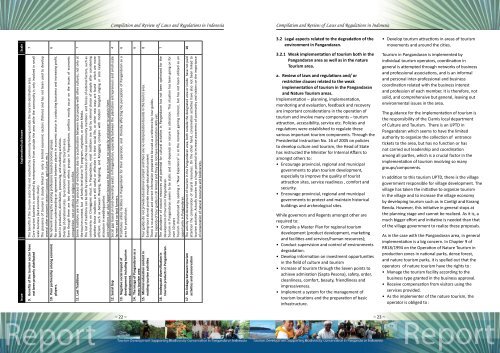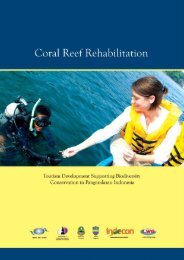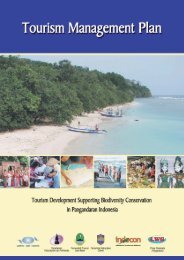Review of Laws and Regulation - unwto
Review of Laws and Regulation - unwto
Review of Laws and Regulation - unwto
- No tags were found...
You also want an ePaper? Increase the reach of your titles
YUMPU automatically turns print PDFs into web optimized ePapers that Google loves.
Compilation <strong>and</strong> <strong>Review</strong> <strong>of</strong> <strong>Laws</strong> <strong>and</strong> <strong>Regulation</strong>s in IndonesiaCompilation <strong>and</strong> <strong>Review</strong> <strong>of</strong> <strong>Laws</strong> <strong>and</strong> <strong>Regulation</strong>s in IndonesiaIssue Explanation/sub issues Scale7The benefits if the tourism sector has not reached the community leaving outside the tourism destination area.Core tourism business is controlled by entrepreneurs from outside the area while the community is only involved in smallscale business (last economic chain).The presence <strong>of</strong> tourism is closely linked to only a limited economic sectors (fishery) <strong>and</strong> has not been used to develop9. Benefits <strong>of</strong> the tourism sector havenot been properly distributed67several other economic sectors (coconut, agriculture, etc.)10. Poor partnership among economic No network among the existing pr<strong>of</strong>essions based economic groups.players.No common underst<strong>and</strong>ing or agreement between players in economic sector in conducting bussiness <strong>and</strong> increasing pr<strong>of</strong>it,both in production, distribution, processing, <strong>and</strong> marketing activities.Overlap <strong>of</strong> oerational sites by economic players in the tourism area.Even though there are two dominant ethnic groups in Pang<strong>and</strong>aran, conflicts mostly occur on the issues <strong>of</strong> economiccompetition, not on ethnic or religion conflict.11. Lost Traditions Some traditions are in the process <strong>of</strong> extinction due to acculturation between local people with other cultures, not only atthe tourism context, but at family level due to TV programs, migration, or other Media.The lost <strong>of</strong> traditions can be both by rational choice <strong>of</strong> the local community members <strong>and</strong> forces <strong>of</strong> external factors, such ascontroversy on Cirengganis ritual. In Pang<strong>and</strong>aran, most traditions are lost by rational choice <strong>of</strong> people after consideringwhether those traditions are still useful or effective t in their social life, or other new ways are found which are moreefficient, such as between Wayang, Rengkong, <strong>and</strong> Ronggeng compare with modern Dangdut singing or solo keyboardattraction in wedding partiesLost traditions can also happen because the actors have no capacity <strong>and</strong> power to sustain them.412. Social Gap Social gap based on l<strong>and</strong> ownership exists in Pang<strong>and</strong>aran, especially between the plantation entrepreneurs <strong>and</strong> small-scalefarmers <strong>and</strong> no-l<strong>and</strong> farmers.6Prostitutes utilize facilities in Pang<strong>and</strong>aran for their operation, <strong>and</strong> thereby affecting the perception <strong>of</strong> Pang<strong>and</strong>aran as aarea for prostitution.13. Negative social impact <strong>of</strong>development including tourismdevelopment.68Tour guides do not provide educational content <strong>and</strong> there are no interpretation boards in the tourist area.Existing tours do not provide enough educational contentThere is no accurate <strong>and</strong> correct information prepared to be used as a reference by tour guides.The capacity <strong>of</strong> tour guides is till limited <strong>and</strong> they do not have interpretation skills yet.14. The image <strong>of</strong> Pang<strong>and</strong>aran as amass tourism area15. Minimal education content inexisting tourism activities7The abundance <strong>of</strong> natural resources <strong>and</strong> potential for cultural activities in Pang<strong>and</strong>aran has not been optimized for thedevelopment <strong>of</strong> tourism in Pang<strong>and</strong>aran.Tourism in Pang<strong>and</strong>aran seems to be static <strong>and</strong> still depends on nature as attraction. This situation has been going on forover 10 yearsTourism characterized by seeking a “New Experience” is at the moment gaining interest, but has not been utilized as anopportunity in Pang<strong>and</strong>aran.16. Inadequate diversification intourism products in Pang<strong>and</strong>aran.10The activity <strong>and</strong> development <strong>of</strong> tourism in the Pang<strong>and</strong>aran area, both outside the designated area or inside have not paidattention the conservation <strong>of</strong> natural resources. On the other h<strong>and</strong>, conservation activities have also not been linked totourism activities. Actually tourism has a huge potential to increase awareness <strong>of</strong> community <strong>and</strong> visitors on the importance<strong>of</strong> conservation <strong>of</strong> natural recourses <strong>and</strong> biodiversity.17. No linkage between tourismactivities <strong>and</strong> conservation3.2 Legal aspects related to the degradation <strong>of</strong> theenvironment in Pang<strong>and</strong>aran.3.2.1 Weak implementation <strong>of</strong> tourism both in thePang<strong>and</strong>aran area as well as in the natureTourism area.a. <strong>Review</strong> <strong>of</strong> laws <strong>and</strong> regulations <strong>and</strong>/ orrestrictive clauses related to the weakimplementation <strong>of</strong> tourism in the Pang<strong>and</strong>aran<strong>and</strong> Nature Tourism areas.Implementation – planning, implementation,monitoring <strong>and</strong> evaluation, feedback <strong>and</strong> recoveryare important considerations in the operation <strong>of</strong>tourism <strong>and</strong> involve many components – tourismattraction, accessibility, service etc. Policies <strong>and</strong>regulations were established to regulate thesevarious important tourism components. Through thePresidential Instruction No. 16 <strong>of</strong> 2005 on policiesto develop culture <strong>and</strong> tourism, the Head <strong>of</strong> Statehas instructed the Minister for Internal Affairs toamongst others to:• Encourage provincial, regional <strong>and</strong> municipalgovernments to plan tourism development,especially to improve the quality <strong>of</strong> touristattraction sites, service readiness , comfort <strong>and</strong>security.• Encourage provincial, regional <strong>and</strong> municipalgovernments to protect <strong>and</strong> maintain historicalbuildings <strong>and</strong> archeological sites.While governors <strong>and</strong> Regents amongst other arerequired to:• Compile a Master Plan for regional tourismdevelopment (product development, marketing<strong>and</strong> facilities <strong>and</strong> services/human resources);• Conduct supervision <strong>and</strong> control <strong>of</strong> environmentsdegradation.• Develop information on investment opportunitiesin the field <strong>of</strong> culture <strong>and</strong> tourism• Increase <strong>of</strong> tourism through the Seven points toachieve admiration (Sapta Pesona), safety, order,cleanliness, comfort, beauty, friendliness <strong>and</strong>impressiveness.• Implement a system for the management <strong>of</strong>tourism locations <strong>and</strong> the preparation <strong>of</strong> basicinfrastructure.• Develop tourism attractions in areas <strong>of</strong> tourismmovements <strong>and</strong> around the cities.Tourism in Pang<strong>and</strong>aran is implemented byindividual tourism operators, coordination ingeneral is attempted through networks <strong>of</strong> business<strong>and</strong> pr<strong>of</strong>essional associations, <strong>and</strong> is an informal<strong>and</strong> personal inter-pr<strong>of</strong>essional <strong>and</strong> businesscoordination related with the business interest<strong>and</strong> pr<strong>of</strong>ession <strong>of</strong> each member. It is therefore, notsolid, <strong>and</strong> comprehensive but general, leaving outenvironmental issues in the area.The guidance for the implementation <strong>of</strong> tourism isthe responsibility <strong>of</strong> the Ciamis local department<strong>of</strong> Culture <strong>and</strong> Tourism. There is an UPTD inPang<strong>and</strong>aran which seems to have the limitedauthority to organize the collection <strong>of</strong> entrancetickets to the area, but has no function or hasnot carried out leadership <strong>and</strong> coordinationamong all parties, which is a crucial factor in theimplementation <strong>of</strong> tourism involving so manygroups/components.In addition to this tourism UPTD, there is the villagegovernment responsible for village development. Thevillage has taken the initiative to organize tourismin the village <strong>and</strong> to increase the village economyby developing tourism such as in Cantigi <strong>and</strong> KarangBenda. However, this initiative in general stops atthe planning stage <strong>and</strong> cannot be realized. As it is, amuch bigger effort <strong>and</strong> initiative is needed than that<strong>of</strong> the village government to realize these proposals.As in the case with the Pang<strong>and</strong>aran area, in generalimplementation is a big concern. In Chapter 9 <strong>of</strong>RR18/1994 on the Operation <strong>of</strong> Nature Tourism inproduction zones in national parks, dense forest,<strong>and</strong> nature tourism parks, it is spelled out that theoperators <strong>of</strong> nature tourism have the rights to :• Manage the tourism facility according to thebusiness type granted in the business approval.• Receive compensation from visitors using theservices provided.• As the implementer <strong>of</strong> the nature tourism, theoperator is obliged to :~ 22 ~~ 23 ~




